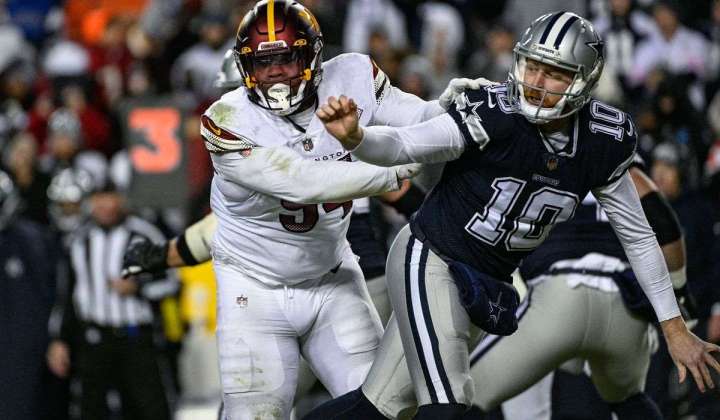Daron Payne franchise tag would make sense for Commanders

The window for NFL teams to use the franchise tag on players with expiring contracts opens Tuesday. And for the Washington Commanders, using the tag on Daron Payne is the logical choice.
Coach Ron Rivera and general manager Martin Mayhew were tight-lipped last month about whether they’d be willing to tag the defensive tackle. Using the tag would allow the team to retain Payne’s rights on a one-year, $18.9 million contract.
Both Rivera and Mayhew have maintained that Payne is part of the team’s plan for next season.
Teams have until March 7 to make a decision, but it would make sense if the Commanders act on Payne sooner than later.
“It’d be difficult to move forward without him, obviously,” Mayhew said after the season. “We have a plan and we definitely wanna get him back.”
One of the downsides of using the franchise tag is that it can complicate negotiations for a long-term deal. That’s something that the Commanders know all too well as Brandon Scherff and Kirk Cousins — the last two players to receive the tag from Washington — eventually left in free agency.
But in both instances, the Commanders got two additional years each from Cousins and Scherff. Both players were handed the tag twice. Cousins predated Rivera, but Scherff was tagged by Rivera’s front office. Scherff’s history offers important context, too, since his second tag — which paid him $18 million in 2021 — was seen as unconventional. Rivera didn’t shy away from paying top dollar to keep the All-Pro for another season.
In Scherff’s case, Washington waited until the final days of the league deadline to hand out the tag — doing so two days before in 2021 and 2020. So if the Commanders want to tag Payne, they might make him wait.
Payne is positioned to cash in after a career year. The 2018 first-rounder recorded 11½ sacks — the most by an interior lineman in franchise history. Payne’s pass rushing has improved every season he’s been in the league, and according to Pro Football Focus, his 48 quarterback pressures were the ninth most among interior defenders last season. Dominant performances by defensive tackles Jonathan Allen and Payne set the tone for the Commanders’ defense last season.
Payne’s breakout year likely has Washington’s brass rethinking whether to try to retain the Alabama product. Before last year, the Commanders seemed prepared to eventually let Payne walk, considering they made Allen (four years, $72 million) one of the league’s highest-paid defensive tackles the year prior, drafted Payne’s potential replacement in second-rounder Phidarian Mathis and failed to reach an extension with Payne.
Tagging Payne would also allow the Commanders to evaluate Mathis and see if he’s truly ready to fill in for the defensive tackle in 2024 — if Payne and the Commanders can’t come to terms on a long-term contract ahead of this coming season. Washington’s evaluation of Mathis was cut short this past season when the Alabama rookie suffered a season-ending knee injury in Week 1. Mathis told reporters his recovery is going well and will be ready for spring workouts.
One of the bigger unanswered questions regarding Payne and the tag is whether the 26-year-old would be receptive to it. He told reporters last month that he “just want what I earned.” Would he attempt to hold out if he doesn’t have long-term security?
The Commanders and Payne would have room to negotiate a multi-year contract, even if the tag is used. The NFL sets a mid-July deadline for players on the tag to reach a long-term agreement. But that hasn’t worked well for Washington in recent history.
Should the situation become truly fraught, the Commanders could look to trade Payne once tagged. After all, since 2018, there have been six players — Davante Adams, Yannick Ngakoue, Jadeveon Clowney, Frank Clark, Dee Ford and Jarvis Landry — who were traded the same season that they were given the tag. Four of those were defensive linemen.
But the “tag-and-trade” option isn’t always realistic. In 2021, Detroit Lions general manager Brad Holmes, for instance, told reporters that they considered the scenario for Kenny Golladay, though ultimately chose to let the wide receiver walk instead.
Golladay then signed a four-year, $72 million contract with the New York Giants.
“There is some difficulty in terms of forecasting that’s involved, so that’s kind of why you probably may see (sign-and-trades) more prevalent in the NBA versus the NFL,” Holmes said.
Washington figures to have the cap room to fit Payne’s contract if he’s handed the tag. The Commanders can — and will — clear $26.2 million off their books once they cut quarterback Carson Wentz. The team is then projected to have more than $33 million in cap space.
There’s always the possibility, though, that Washington opts not to tag Payne at all and let him fully test the market. But Payne would then join what’s expected to be a robust free agency for defensive tackles — one in which the Commanders could get outbid.
The Commanders could also look to use the cheaper transition tag ($16 million), which would allow Payne to become a free agent but allow Washington to match any deal that he signs.
If Payne were to leave under that scenario, however, Washington would receive no compensation, whereas the team would be entitled to two first-round picks if another club signed Payne and Washington didn’t match it once offered the franchise tag. (For practical purposes, assume Washington would assign Payne the nonexclusive franchise tag rather than the exclusive franchise tag, which would be even more expensive but prevent him from negotiating with other teams at all.)
Keeping Payne, at least for the short term, eliminates all of that risk.






